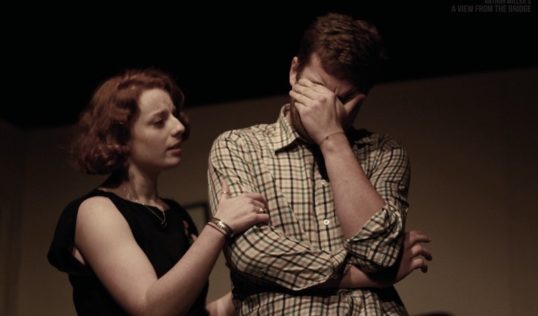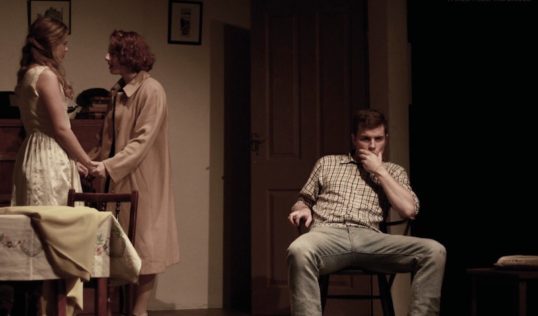A View From The Bridge
★★★☆☆ Well told
Bedlam Theatre: Wed 25 – Sat 28 Oct 2017
Review by Thom Dibdin
A View from the Bridge, Arthur Miller’s great tragedy of loyalty and miss-placed love in the tenements of the waterfront slums of 1950s New York is given a solid production from the EUTC at Bedlam this week.
It’s a production which seeks out the story of Eddie Carbone and his family and reveals it well, dwelling on his failing relationship with his wife Beatrice and increasingly inappropriate relationship with her orphaned niece, Catherine.
Yet for all its strong attention to detail when Beatrice’s cousins, Marco and Rodolpho, arrive from Italy as illegal immigrants, it never really soars to a point where it has a strong resonance with more modern issues.
The tone is set by Peter Morrison as the neighbourhood lawyer Alfieri, the bridge between the Italian and American communities, whose monologues frame the whole play. He takes his time over the description of the neighbourhood and its Italian roots, which are being subsumed into the American way.
There is poetry hidden in those lines, however, poetry of a kind which only Alfieri and Rodolpho ever really express. And while Morrison brings our the necessary structural details and is quite the stern elder figure when he is visited by Eddie, he doesn’t allow the tang of sea salt to seep in – or expose the full viciousness of Sicilian justice.
The role of Eddie demands a big performance. He has done everything it says on the tin of the American Dream, but opens it to find his own failings. Paddy Echlin invests him with both power and a sense of humanity. He is, you feel, a god in his own household. Yet his feelings for Catherine are somewhat muffled – never really shown in Eddie’s actions and only really revealed by Beatrice.
strong identity and character
Miller famously underwrites the female characters of the play, and Matilda Botsford does a great job to invest Beatrice with a strong identity and character. Her Beatrice walks round Eddie gently and has the guile to sway her man – while he has the understanding – at least at the outset – to be swayed by argument.
Catherine, who they have looked after most of her life, is potentially the most interesting character for modern production of the play to investigate. And director Andra Gavin has Eleanor Crowe find a lot more spirit in the character than is in the writing, but there is little to be seen of her innocent sensuality which remains, again, in Beatrice’s descriptions.
Gavin shows a real skill at directing the minutia of the performance with the arrival of the cousins. Quickly overcoming the distractions of their Italian accents, Leo Sartain is a strong and taciturn Marco, while you quite believe the Paper Doll nickname ascribed to Henry Coldstream’s Rodolpho when he has gone to work at he docks.
But it is in the scenes where the five are sitting around talking that this really hums. The set is tiny, but the unsaid conversation – the glances and raised eyebrows between characters – is expertly done and really adds to the text, fleshing out the characters and building the first act as Eddie’s jealousy of Rodolpho begins to emerge and his bullying riles Marco into the feat of strength, lifting a heavy chair above Eddie’s head, that leaves the act in a powerful tableaux blackout.
If the production were to end there, as a setting for what might be, all would be well and good. Unfortunately, it has a whole second act to get through. And it is just too fraught. Speed is made to equate to anger and violence – it all falls out with a rush and where Gavin has found hidden passions in the first Act, she doesn’t wholly convince when they are given physical reality in the second.
The only passion which seems to have a truth to it is that between Catherine and Rodolpho, making Eddie’s ultimate betrayal all the more selfish and serving neither of his cultures, American and Italian. But by rushing through it, Gavin never allows the enormity of his deed to get the emphasis in deserves – and probably needs.
The staging is reasonably well conceived, although a bit more time could have been spent in the lighting tech. What does jar, however, is a singular lack of attention to the personal detail of some of the characters, whose personal jewellery is visible, removable and clearly out of keeping with either the characters or the time.
A production which has a good storytelling ethic, but which pulls back from finding greater truths in a piece that is just ripe for such exploitation.
Running time: 1 hour 45 minutes (including one interval)
Bedlam Theatre, 11 Bristo Place,, EH1 1EZ
Wednesday 25 – Saturday 28 October 2017.
Daily at 7.30 pm
Full details and tickets on the Bedlam website: www.bedlamtheatre.co.uk
Bedlam on Facebook: /bedlamtheatre.ed
Twitter: @bedlamtheatre
ENDS





















Comments (1)
Trackback URL | Comments RSS Feed
Sites That Link to this Post